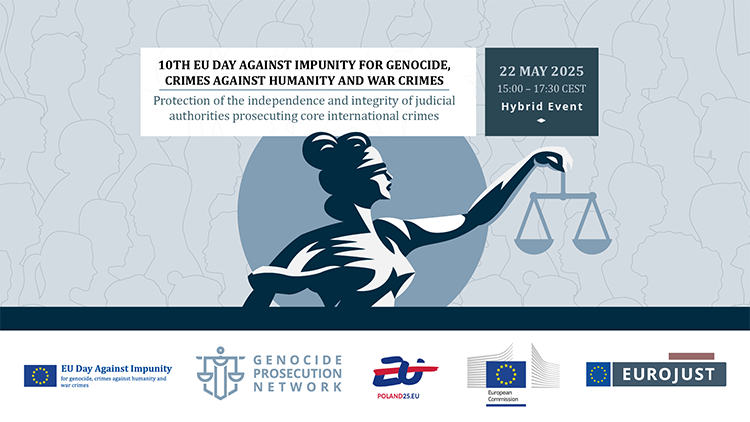
On 22 May 2025, Eurojust, the Genocide Prosecution Network, European Commission and Polish Presidency of the Council of the EU jointly marked the 10th EU Day Against Impunity for genocide, crimes against humanity, and war crimes. The hybrid event gathered 175 representatives of judicial authorities, civil society and the diplomatic community at Eurojust’s headquarters and online to discuss the protection of the independence and integrity of judicial authorities investigating and prosecuting core international crimes.
International judicial authorities are increasingly confronted with challenges such as sanctions, funding limitations, and lack of cooperation. These obstacles risk disrupting ongoing investigations and proceedings, ultimately undermining justice for the victims of some of the most heinous crimes.
The opening remarks provided by Eurojust, the Polish Ministry of Justice and the European Commission, underscored the significance of international judicial institutions, including the International Criminal Court (ICC), in ensuring justice for core international crimes.
Mr Michael Schmid, Eurojust President: Delivering justice for core international crimes is not optional. It is essential for security, stability and the rule of law. The EU Day Against Impunity reminds us that accountability cannot wait and that the EU will not look the other way. Together with independent international justice systems, we will be a force for accountability and make global justice part of who we are.
Mr Adam Bodnar, Minister of Justice of Poland: Our unified European support for international accountability for war crimes is more important than ever. But we should not forget that independence of judicial authorities is one part of the story. The other is what we do in order to document war crimes and for this I’m grateful for Eurojust’s support and the work of authorities in other EU Member States.
Mr Michael McGrath, European Commissioner for Democracy, Justice, the Rule of Law and Consumer Protection: The independence and impartiality of international judicial bodies are not negotiable. These institutions do not serve geopolitical interests; they serve the law; and the law serves the people it is enacted to protect.
The event also featured a keynote address from Mr Frank Hoffmeister, Head of the Legal Department of the European External Action Service, as well as a panel discussion featuring representatives from the ICC, Council of Europe, civil society, and EU Member States. The panellists examined how these challenges undermine the effective delivery of justice and restrict victims’ access to it. They emphasised the urgent need for strong collaboration among states, international organisations, and civil society to safeguard the integrity and impartiality of judicial bodies in an increasingly complex landscape.
Since 2016, Eurojust has joined the Genocide Prosecution Network, European Commission and Presidency of the Council of the EU to host an event on or around 23 May to raise awareness of the most heinous crimes and promote national investigations and prosecutions. In previous editions, they have discussed topics such as the cumulative prosecution of foreign terrorist fighters, accountability for core international crimes committed in Syria, and the commemoration of the 30th anniversary of the 1994 genocide against the Tutsi in Rwanda.
These annual events highlight the efforts and commitment of EU Member States in enforcing international criminal law with the support of the EU. To see an overview of all previous editions, visit our website.
